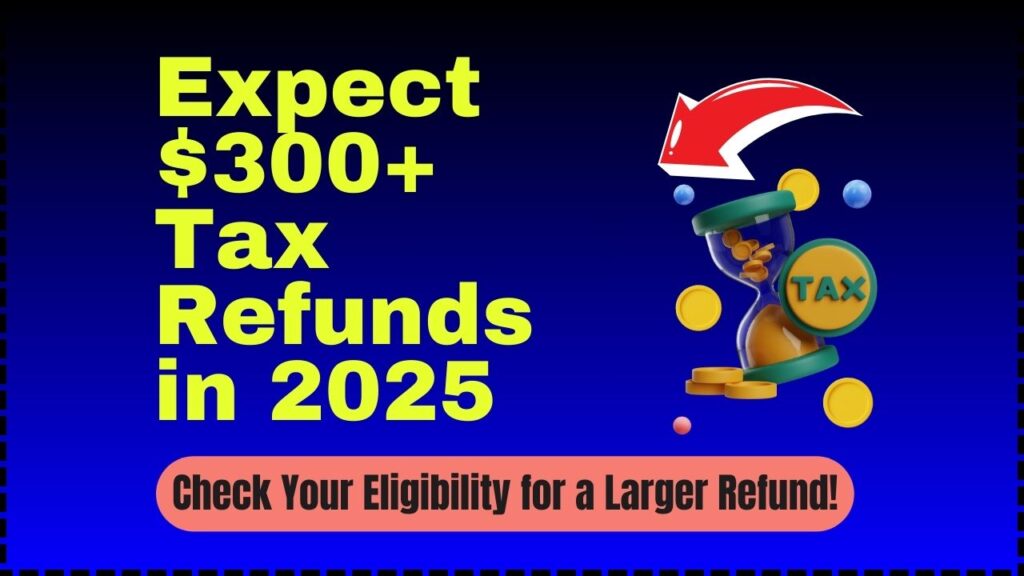Expect $300+ Tax Refunds in 2025: As the 2025 tax season unfolds, many Americans are discovering that their refunds are larger than in previous years. With the IRS implementing inflation adjustments and various tax credits available, taxpayers can expect refunds exceeding $300, with the average refund amount reaching approximately $3,221 as of early April. Understanding the factors that influence your refund can help you get the biggest refund possible. This guide breaks it all down in a simple, conversational tone—so whether you’re a seasoned tax filer or a beginner, you’ll walk away informed and confident.
Expect $300+ Tax Refunds in 2025
Tax refunds in 2025 are bigger for many Americans thanks to higher income thresholds, inflation adjustments, and valuable tax credits. Whether you’re expecting a few hundred or a few thousand dollars, understanding your refund and how to maximize it puts more money in your pocket. Filing early, double-checking credits, and making strategic financial moves now can pay off later. Take the time to review your return—or get help from a tax pro—to ensure you’re not leaving money on the table.

| Topic | Details |
|---|---|
| Average Refund Amount (2025) | $3,221, up from $3,081 in 2024 |
| Standard Deduction (2025) | Single: $15,000; Married Filing Jointly: $30,000; Head of Household: $22,500 |
| Child Tax Credit | Up to $2,000 per qualifying child under 17; $1,700 may be refundable |
| Earned Income Tax Credit (EITC) | Up to $7,830 for low-to-moderate-income workers with children |
| IRS Filing Deadline | April 15, 2025; extensions available until October 15, 2025 |
| Official IRS Website | https://www.irs.gov |
What Is a Tax Refund?
A tax refund is the money you get back from the government when you’ve paid more in taxes throughout the year than you owe. It’s essentially a repayment of your overpaid taxes—often due to paycheck withholding, estimated payments, or refundable credits.
Factors That Affect Your Refund
1. Your Income and Withholding
The more income you earn, the more taxes you owe—but if your employer withholds more than necessary from your paycheck, you’ll likely get a refund.
2. The Standard Deduction
For 2025, the IRS adjusted the standard deduction to keep up with inflation:
- Single: $15,000
- Married Filing Jointly: $30,000
- Head of Household: $22,500
This deduction reduces the amount of income you’re taxed on, often increasing your refund.
3. Tax Credits
Tax credits can reduce your tax bill dollar-for-dollar. Some of the most impactful include:
- Child Tax Credit (CTC): Up to $2,000 per qualifying child under 17. Up to $1,700 of this is refundable.
- Earned Income Tax Credit (EITC): Designed for lower-income workers. In 2025, this credit is worth up to $7,830 for qualifying families.
- Education Credits: The American Opportunity Credit (up to $2,500) and the Lifetime Learning Credit (up to $2,000) help with tuition and school expenses.
4. Deductions
Deductions lower your taxable income. Common examples include:
- Student Loan Interest Deduction: Up to $2,500
- Traditional IRA Contributions: Up to $7,000 (for those 50 and older)
- Health Savings Account (HSA) Contributions: Up to $3,850 for individuals or $7,750 for families
Smart Ways to Expect $300+ Tax Refunds in 2025
1. Max Out Retirement Contributions
If you contribute to a Traditional IRA or 401(k), those contributions reduce your taxable income. That means a bigger refund (or a smaller bill).
Example: A $6,000 contribution in the 22% tax bracket can yield a $1,320 tax reduction.
2. File Early and Electronically
Filing your taxes early not only helps you get your refund sooner but also protects you from fraud. E-filing and choosing direct deposit can cut your refund time to just 21 days, according to the IRS.
3. Double-Check Eligibility for Credits
Many people overlook valuable tax credits like the Saver’s Credit, Dependent Care Credit, or Education Credits. Check IRS tools or use a professional service to ensure you’re not missing anything.
4. Adjust Your W-4 Withholding
Getting a big refund every year? That’s your money being held all year by the government. Adjusting your W-4 form can boost your monthly take-home pay.
IRS Fires Thousands Right Before Tax Deadline – Will Your Tax Return Be Delayed?
IRS Tax Refunds vs. PFD Direct Deposits in 2025: Which Offers More?
$750 Direct Deposit in 2025? Don’t Fall for the Hype Until You Read This!
Frequently Asked Questions (FAQs)
1. When will I get my refund?
If you e-file and opt for direct deposit, you could receive your refund in as little as 21 days. Paper filers or those with errors may wait longer.
2. What if I made a mistake on my return?
You can file an amended return using Form 1040-X. Don’t wait—corrections may speed up the refund process if you’re owed more money.
3. Can I still claim missed stimulus checks from past years?
Yes. If you didn’t get your 2021 stimulus payment, you may still claim it using the Recovery Rebate Credit—but only if you file your 2021 return by April 15, 2025.
4. What if I can’t pay my tax bill?
The IRS offers payment plans. Filing on time—even if you can’t pay—helps you avoid late-filing penalties and reduces interest.
5. What tools can help me estimate my refund?
Use:
- IRS Tax Withholding Estimator
- TurboTax TaxCaster
- H&R Block Refund Estimator







